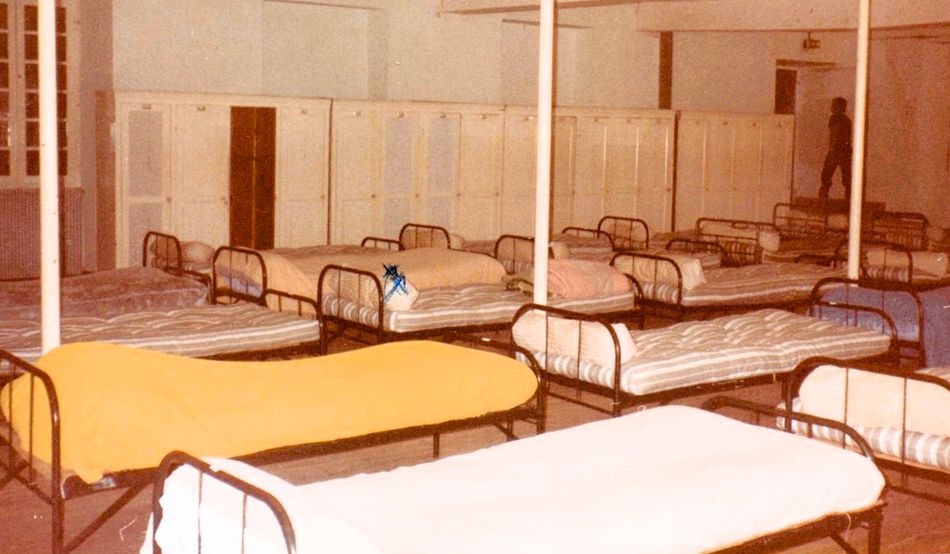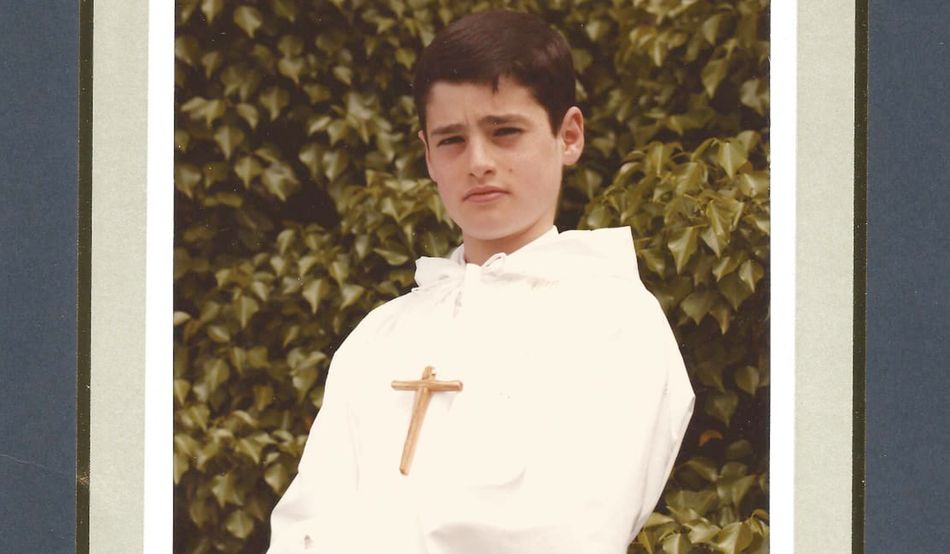Cheval always turned his signet ring inwards before he slapped a student. Such was his routine. In the 1980s, children who attended Notre-Dame-de-Bétharram, an elite Catholic boarding school in southwest France, knew to look out for the turn of the heavy gold ring towards the inside of the palm that would deliver the blow. Older pupils also knew to check his crotch for the erection that would inevitably signal impending punishment.
When Alain Esquerre, whose book The Silence of Bétharram came out in April, tells me about this on the phone, he seems much younger than his 53 years. There’s a softness in his voice that makes him sound 13. That’s how old he was when Cheval—the student supervisor who proclaimed himself a “prefect of discipline”—first punished him. Poor grades, Esquerre recalls, equalled four slaps to the face and a kick to the stomach while lying on the floor of Cheval’s office.
They called him Cheval because he looked like a horse (“and he kicked like one, too!” Esquerre says with almost adolescent cheek.) But also because of his signet ring—the piece of heraldic jewellery the French call a chevalière. Cheval’s actual name is Damien Saget. Esquerre and his former peers accuse the 70-year-old former supervisor of terrorising pupils for a period of 11 years.
For decades, almost no one complained. When someone did, they were either silenced or ignored. This was Bétharram, after all. Violence was part of the curriculum.
Everything changed 40 years later. In October 2023, Esquerre sat at his desk in his mother’s home in Lestelle-Bétharram, the town where he still lives, and created a Facebook group. That day, he had run into one of his abusers near the school—not Cheval, but one of a number of other adults at Bétharram who, as he recounts in his book, beat him and his peers. Appalled to discover that this man was still working at his alma mater and around young children, Esquerre decided to take matters into his own hands.
With his white hair and half-rimmed glasses, Esquerre hardly cuts the figure of a revolutionary. In fact, he prefers to compare himself to unassuming Bilbo from Tolkien’s The Hobbit. But because he suspected that others like him might be ready to speak up, he created a space for Bétharram’s former students to break their decades-long silence. He expected a trickle of stories. He got a flood.
Armed with a phone and an Excel spreadsheet, Esquerre’s meticulous documentation of one of the darkest chapters in France’s educational history reveals something deeper: a culture of silence, discipline, obedience and violence inside French educational philosophy.
Esquerre thought every account would be like his: beatings, near-starvation, stinging nettles rubbed on skinny legs to punish tardiness, freezing showers, syringes filled with water that Cheval allegedly shot under the skin of his charges in the infirmary, causing excruciating blisters to bubble up along their arms. Within the school he nicknames “the gulag of the Pyrenees”, Esquerre imagined there had probably been psychological abuse as well.
But he hadn’t expected the sexual violence—at all. At Bétharram, it was everywhere, Esquerre would soon discover. He tells me he was shocked to find out that the abuse of some of his peers went so much farther than his own. Esquerre heard stories of voyeurism, forced nudity, molestation and rape. In the end, via the Facebook group—now 2,400 strong—more than 200 testimonies found their way to him. Esquerre recorded each one in an ever-growing document, trying to discern a pattern so that he might one day file a complaint for systemic abuse to the local public prosecutor. He likes to refer to the mountain of horrors piling up on his desk as the “Bétharram papers”.
On 30th January 2024, Esquerre sent the first wave of testimonies. On 1st February, he got his first phone call from a journalist. Since then, Esquerre tells me, he feels as if every single reporter in France has somehow got hold of his number.
Two parental complaints were for slaps so harsh they had shattered eardrums
More than one year later, in February 2025, Saget was one of three men taken into custody over allegations of aggravated rape, aggravated sexual assault and/or aggravated violence; he was later released because the statute of limitation had expired to prosecute him. In its communique, the public prosecutor’s department specified that Saget had “firmly denied all the sexual allegations made against him”, but had admitted to slapping “certain students within the framework of correction”—a French synonym for corporal punishment.
That Esquerre’s work would eventually lead to a national reckoning is partly due to Bétharram’s connection with France’s prime minister, François Bayrou. “If I dared,” Esquerre quips, with a touch of gallows humour, “I’d say: ‘Thank you, mister prime minister.’ He helped put us in the headlines.” For better or for worse, Bayrou is why Bétharram has consistently dominated the French news agenda since February this year, when the investigative site Médiapart exposed the newly nominated PM’s formerly close ties to the school.
Bayrou, Médiapart revealed, had sent three of his children to Bétharram. As president of the Pyrénées-Atlantiques region, he had been on the board and secured funding for the school. His wife, Élisabeth, had even taught catechism there. And Bayrou was French minister for education in the 1990s, when the first scandal broke.
During his time at the education ministry, parents filed a series of complaints against the school with the local authorities. One, in 1996, was for hypothermia contracted by a pupil who had been made to stand outside half-naked. Two were for slaps so harsh they had shattered eardrums. That same year, a handful of parents and students, along with one teacher, testified in the local press. In 1998 yet another complaint was filed, for the rape of a 10-year-old boy by Bétharram’s director, Father Pierre Silviet-Carricart.
Bayrou was no longer minister for education, but he still had children at the school and was still head of the departmental council. Though he now claims he never heard about any of the complaints back then, the judge in charge of the Silviet-Carricart case, Christian Mirande, revealed to Le Monde in March 2024 that Bayrou had spoken about it to him at the time. Mirande says the politician pleaded in favour of both the institution and the accused priest, described Silviet-Carricart as an “honest man”, and worried about what such a scandal might do to the reputation of his son’s school. When Silviet-Carricart committed suicide in 2000, and was buried in the school grounds, Bayrou’s wife attended the funeral.
In a shocking turn of events, the PM’s daughter, now in her fifties, recently revealed that she, too, had suffered abuse at Bétharram, in 1986. Though she never confided in her father back then, Hélène Perlant vividly remembers, aged 14 at a summer camp, being kicked, punched and dragged by the hair by a member of the order. She says she was left to spend the night curled in a sleeping bag wet with her own urine.
After the allegations made in the late 1990s, Bétharram, though partially funded by the French state, was subjected to a perfunctory academic inspection by the education ministry, which found no evidence of wrongdoing. How could it, really, when the inspector himself admitted, in an interview with French daily Libération this February, that he had not spoken to any students, had “not tried to know what was going on in the dormitories”?
Had he asked the right questions, he might have heard how, as Esquerre tells me, Silviet-Carricart would have an older student bring a younger one to the director’s office in the mornings to be sexually abused. He might also have found out which Bétharram higher-ups (priests, supervisors or older students) liked to roam the dormitories at night or the tents at summer camp; which of them stopped at peering under the covers; which of them went further.
But no one wanted to look that hard. The school’s baccalaureate results were far above the national average. Generations of parents kept sending their children to Bétharram.
It was seemingly only after Emmanuel Macron chose Bayrou as his latest prime minister that the allegations of systemic abuse at the school warranted a thorough inspection, followed by an endless stream of news reports and an investigative inquiry conducted by parliament itself.
As soon as the Bétharram scandal transformed into one about Bayrou, the abuse became a subplot in a political drama
During his hearing, Bayrou maintained, as he had in February when Médiapart’s revelations first came out, that he “had not been informed of anything regarding violence, and a fortiori sexual violence” at Bétharram. He repeated that he’d not been privy to any privileged information, nothing beyond what the press had printed in the 1990s. “If my presence as a political target,” he concluded, “has allowed these facts, this #MeToo of childhood to come out, then at least it will have been useful.”
Unsurprisingly, though, as soon as the Bétharram scandal transformed into one about Bayrou, the abuse—along with the trauma, suicides and shattered lives of Bétharram’s victims—became a subplot in a political drama.
If we look at the press coverage, a pattern quickly emerges. Between Esquerre’s creation of the Facebook group in October 2023 and Bayrou’s nomination as prime minister in December the following year, 105 French press articles mentioned the terms “Bétharram” and “violence”. Since then, the number of stories that mention violence at the school has risen to 1,635. But if you remove “violence” and replace it with “Bayrou”, the number goes up to 7,016. Worse: victims of Joël Le Scouarnec, the surgeon currently on trial for the rape and sexual assault of at least 299 of his underage patients in yet another massive French paedophilia case, say their case has been unjustly “invisibilised” by the Bétharram scandal. The story has become one of power and politics, not the dignity of survivors.
Beyond France, to my knowledge, the Christian Science Monitor is the only Anglophone media outlet that has spoken to Alain Esquerre—the rest have focused on the political crisis. The Swiss daily Le Temps published a long piece on the topic, entitled “Notre-Dame-de-Bétharram was hell for many children. Now it’s hell for François Bayrou, too.”
For French Catholic schools at least, the scandal has sparked a #MeToo moment. Esquerre tells me about a WhatsApp group where, at all hours of the day and night, 140 former students—and growing—from Catholic schools across the country trade stories of abuse. When they named names, Esquerre discovered that Damien Saget—Cheval—did not stop at Bétharram. Through other members of the group, Esquerre learned that Saget had become an education counsellor in another school in Orléans before being named principal at Léon XIII, a school for under-14s in central France. He stayed there until his retirement in 2018—and his methods allegedly remained the same.
This, the historian Claude Lelièvre tells me, is why Bétharram is only an “interrogation room”. Once we’ve listened to the victims, questioned the suspects and found the perpetrators, we must interrogate the case as a whole—the flaws in the system that let the crime go unpunished for so long.
Lelièvre, who has spent his career tracing the ideological foundations of the French education system, argues that we must go beyond one school, and “confront the weight of historical context and the much slower, more uncertain evolution of practices”. Bétharram, he explains, emerged from an enduring pedagogical model that links suffering with success. Though France is not alone in the preponderance of abuse scandals in religious institutions and boarding schools, Lelièvre argues that the reason the country has not (yet) seen a moment of reckoning with injustices at this scale is because of the enduring legacy of the Counter-Reformation, and what he calls the French cult of obedience.
In the 18th century, the Catholic church, so as to present itself as an alternative to the Protestant Reformation, preached (among other teachings) a revival of authority and obedience. In French schools, this signified reliance on corporal punishment not as a last resort but as an official, even methodical practice, detailed in pedagogical manuals.
So when, across the country, Catholic institutions like Bétharram maintained these disciplinary models well into the late 20th century, it wasn’t seen as an anomaly. It was seen, by some, as tradition. Parents chose—and still choose—schools like Bétharram precisely because discipline there is harsh and children are “kept in line”.
But the problem goes far beyond religious education. Though France’s secular republican school system eventually rejected the Counter-Reformation framework and banned corporal punishment in schools in the 19th century, Lelièvre insists that many of these foundational ideas have endured. While a child of the République was no longer to be terrified into submission, they should still be controlled and shaped through authority.
“In France,” Cuerq tells me, “children are often not seen as rights-holders, but as citizens of tomorrow”
So deep is the assumption that control breeds success that many forget that this is fertile ground for mistreatment. “What we have to understand,” Marion Cuerq, an essayist specialising in children’s rights tells me, “is that Bétharram was never an outlier. In fact, it’s a symptom.”
At 19, Cuerq left France for Sweden, whose avant-garde approach to child-rearing she wished to study. What she discovered was not just a different approach to punishment, as she’d expected, but to childhood and children themselves. She says it helped her better understand where, she believes, France had failed.
In most modern democracies, the child is gradually being recast as a rights-bearing individual. But in France, that transformation has lagged. In 2019, a law was passed to ban corporal punishment in the home as well as the school. France was only the 56th country to do so. The law remains mostly symbolic, with no formal enforcement mechanisms, barring a report by a medical professional.
“In France,” Cuerq tells me, “children are often not seen as rights-holders, but as citizens of tomorrow”. The focus, her research shows, is placed on their development in the future, never on dignity in the present. To illustrate her point, Cuerq brings up François Bayrou. She reminds me that in 2002 the then presidential candidate was filmed slapping an 11-year-old child who’d tried to pick his pocket on the campaign trail. The footage significantly improved Bayrou’s opinion ratings. He gained a reputation as a good, sensible father. On a series of talkshows, the politician explained that, were his own children to be found misbehaving, he’d want them treated the same.
Culturally, Cuerq explains, France is deeply suspicious of children, mistrustful even. She says many French parents are taught that, with too little discipline, their children might just become tyrants—or, as the French expression goes, enfants rois. Though the concept itself doesn’t exist in the English language, the best translation is “king-children”. And what do we French do to our kings? We cut off their heads, of course.
The tragedy of Bétharram lies not only in what was done to the children behind its stone walls, but in how long it was allowed to go on—and how easily the violence was reframed, forgotten or folded into national myths about education, authority and success. For decades, and up until very recently, men such as Damien Saget were not only tolerated, but moved between institutions, their cruelty repackaged as rigour, their brutality excused as discipline. The silence was systemic, the oversight performative and the suffering—when acknowledged at all—overshadowed by political theatre.
On 2nd July, the investigative inquiry triggered by the Bétharram scandal and conducted by parliament released its report on physical, psychological and sexual violence in French schools. The report found that Notre-Dame-de-Bétharram “concentrates on its own all of the characteristics and dysfunctions of the school system”: warnings ignored, silence from adults, institutional protection of aggressors.
As for Bayrou, the lawmakers found that he could not have had "any ignorance as to the seriousness the facts.” This, they note, “in the absence of concrete action aimed at protecting children and punishing the perpetrators, engages the political responsibility of the minister.” They add that Bayrou “had the means to initiate” action, but did nothing, and that as a result, the physical and sexual violence “continued for years”. And, in one surprise revelation, the report devotes two pages to Saint-Jean de Pélussin, a secondary school in the Loire Valley where shattered eardrums and sexual abuse were just as common as they were at Bétharram. The report reveals Bayrou was also warned about abuse at Pélussin when he was minister, and reportedly chose to stay silent.
Despite these damning findings, and despite one of its members accusing Bayrou of perjury, the committee will not request legal action against the prime minister.
Bayrou himself has yet to respond—to the accusation of perjury, to the report itself, and to the new revelations about his silence on Pélussin.
If school abuse scandals are to play a part in the downfall of France’s latest prime minister, and they just might, Esquerre hopes it could also be the end of denial. “This is our opportunity to do better,” he says, “so that breaking the silence of Bétharram might shape a new culture of listening.”
Nestled deep in the Pyrenean foothills, there once stood a sanctuary called Bétharram. According to legend, its name stems from a 16th-century story: a girl, swept away by the Gave de Pau River, was saved by a branch sent by the Virgin Mary that pulled her to shore. Beth arram, in the local dialect, means “beautiful branch”.
To Alain Esquerre, Bétharram was a sanctuary in name only. But the image of the branch has stayed with him. Today, he tells me, he sees it as his mission. To one survivor at a time, he extends a branch. Nothing divine or miraculous—just something to hold on to.
This article has been updated to reflect the increased size of Alain Esquerre's Facebook group














